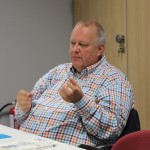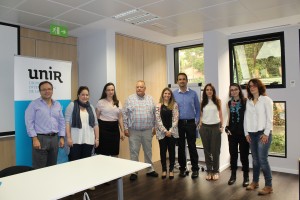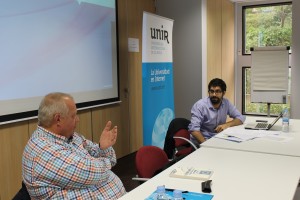Marcel J. Veenman: “Even brighter students have to keep developing metacognition skills”

Marcel J. Veenman, founder of the Institute for Metacognition Research and Chief Editor of an Springer Journal, Metacognition and Learning, was the key speaker in the I Workshop on Applied Metacognition organized by the UNIR Research Group on Applied Metacognition (GIMA). We talked to him about the latest findings in that interesting field of knowledge which deals with skills that allow students to improve their learning by monitoring the processes involved in it.
UNIR Research: What is the importance of assessment in Metacognition?
Marcel J. Veenman: Metacognition is one of the most important factors in how the human learning evolves. It is one of the best predictors of learning outcomes so it should be one of the things that we should apply when we are learning, although most of us don´t do so. In particular, assessment in Metacognition is important because it helps you to detect which students lack metacognitive skills, so you can train them.
“You can’t train intelligence. It doesn’t work. It is partly on your genes”
UNIR Research: Should this discipline be more present in general educational debate? Is metacognition an issue ordinary people knows enough about?
Marcel J. Veenman: Metacognition deals with how you think, how you remember things and also with how you organize information in order to control your thinking process. Moreover, its related skills have to do with learning to analyze problems, planning, and monitoring. This last means tracking what you do to avoid making mistakes and, when you are still on the right track, keep checking on yourself. It has also to do with evaluation, that is, What did I do? Is that correct? And, if I did what I had to do, then I have to go back to the question that launched the whole process and answer it. But sometimes we are not doing the right questions.

UNIR Research: Are we able to be smarter?
Marcel J. Veenman: You can’t train intelligence. It doesn’t work. It is partly on your genes and it is partly on your skills long term development. But you can train someone to become more organized, to check himself better. You can also train to evaluate yourself better, to reflect about what you are doing. Then, you became a better student, we know that from many examples from research.
“Metacognition is part of intelligence and that even the brighter students have to keep developing it”
UNIR Research: Is that problem one of the main goals of your research efforts in the Institute?
Marcel J. Veenman: Yes, it is one of the main. I give lectures, and workshops for teachers, in order to bring them to use this knowledge in the classroom and make their students better. The other objective is to do more research both on how we can improve our understanding of metacognition, and on the techniques for instructing metacognition.
UNIR Research: Could you tell us something about your latest advances on the field?
Marcel J. Veenman: I am not going to talk about the technical work, but researchers have found out that metacognition is part of intelligence and that even the brighter students have to keep developing it. It was supposed that those who are intellectually gifted, would be also well metacognitive developed. Yet we have recently studied a large number of Secondary school groups and we have found out from the participants that almost 50% of the allegedly brighter were actually scoring lower than the average of students.

UNIR Research: What can that mean?
Marcel J. Veenman: One of the explanations is that some of these students relay just on their intelligence when they arrive at secondary education. It is a piece of cake for them. Why should you develop something that requires a lot of effort if you don’t need it? You can rely on your intelligence and being successful. The problem comes later when the subjects of study become more complex and the pressure for exams is coming up. It is then when they found out they are lacking something. And it is the same truth when they enter in University. Even I have had cases coming from with the best outcomes in the school, that get negative qualifications in Higher Education. We should be aware that even high intelligences students need to collect metacognitive skills. Likewise, there is other half of the population from whom we can see that many students who are not that bright, can compensate for that by being very proficient metacognitively.
Even high intelligences students need to collect metacognitive skills
UNIR Research: And there was a moment in your life when you decided to put all your efforts into these problems…
Marcel J. Veenman: I have worked for a number of years at the university and I got stuck doing the same work for many hours a day, and correcting my students not for the content but for grammar. That should not be my task as a University Professor. I wanted to be busy with the content, not with the writing. That was kind of frustrating and I thought ‘Ok, I have ten more years to go before I retired, so I want to do the things that are important for me and for the rest of the world, in terms of metacognition’. I want to do relevant things, that is why I started this Institute.
UNIR Research: What do you thing about the ongoing research on Metacognition at UNIR Research?
Marcel J. Veenman: They are doing a hard work, we have had a very interesting discussion, some of the comments have been very thoughtful, and that is something to learn a lot from. With this workshop, we are trying to become better researchers together. That is the idea why I’m here, it is not tell them what they have to do, but to have a discussion in order to improve us all.
For further information:
Carlos Fernández-Alameda
UNIR Research
